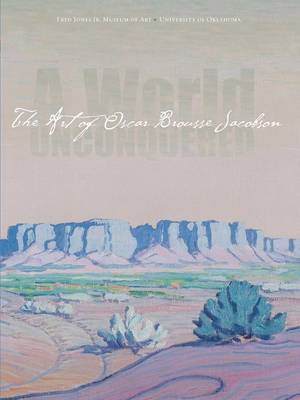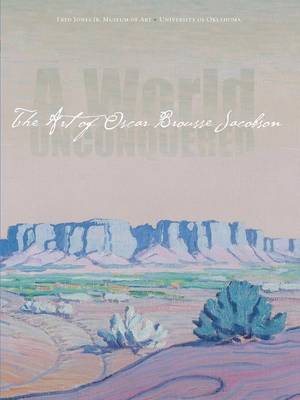
- Afhalen na 1 uur in een winkel met voorraad
- Gratis thuislevering in België vanaf € 30
- Ruim aanbod met 7 miljoen producten
- Afhalen na 1 uur in een winkel met voorraad
- Gratis thuislevering in België vanaf € 30
- Ruim aanbod met 7 miljoen producten
Zoeken
A World Unconquered
The Art of Oscar Brousse Jacobson
Anne Allbright, Janet Catherine Berlo, Mark Andrew White
Paperback | Engels
€ 21,45
+ 42 punten
Omschrijving
Oscar Brousse Jacobson (1882-1966) was a prolific artist who devoted much of his career to the depiction of the wilderness of the American West, especially Arizona, Colorado, New Mexico, and Oklahoma. He also became a passionate supporter of the visual arts in the Southwest and an enthusiastic promoter of Native American fine artists, such as the early Kiowa artists, Acee Blue Eagle, and others. Over the course of his forty-year career at the University of Oklahoma, he oversaw the dramatic expansion of the School of Art and the creation of an art museum in 1936 that would eventually become the Fred Jones Jr. Museum of Art. A World Unconquered: The Art of Oscar Brousse Jacobson surveys the career of this important yet often overlooked artist. Following his study at Bethany College in Lindsborg, Kansas, with Birger Sandzén, Jacobson became an advocate for modernism and embraced the wilderness as his primary subject. Drawn to the seemingly inhospitable and desolate, Jacobson favored the desert, which eventually led him to paint the Sahara in 1925-26. He balanced a productive painting career with an inexorable desire to promote appreciation for and knowledge of world cultures in the new state of Oklahoma. Jacobson organized exhibits of Asian, Native American, and North African art and culture at OU and played an important role in facilitating New Deal post office murals in the state. Published in conjunction with a retrospective exhibition of Jacobson's career, A World Unconquered offers the first critical analysis of his work as both an artist and a cultural figure and coincides with the centennial of his arrival in Oklahoma in 1915.
Specificaties
Betrokkenen
- Auteur(s):
- Uitgeverij:
Inhoud
- Aantal bladzijden:
- 154
- Taal:
- Engels
Eigenschappen
- Productcode (EAN):
- 9780985160982
- Verschijningsdatum:
- 8/07/2015
- Uitvoering:
- Paperback
- Formaat:
- Trade paperback (VS)
- Afmetingen:
- 226 mm x 302 mm
- Gewicht:
- 884 g

Alleen bij Standaard Boekhandel
+ 42 punten op je klantenkaart van Standaard Boekhandel
Beoordelingen
We publiceren alleen reviews die voldoen aan de voorwaarden voor reviews. Bekijk onze voorwaarden voor reviews.











